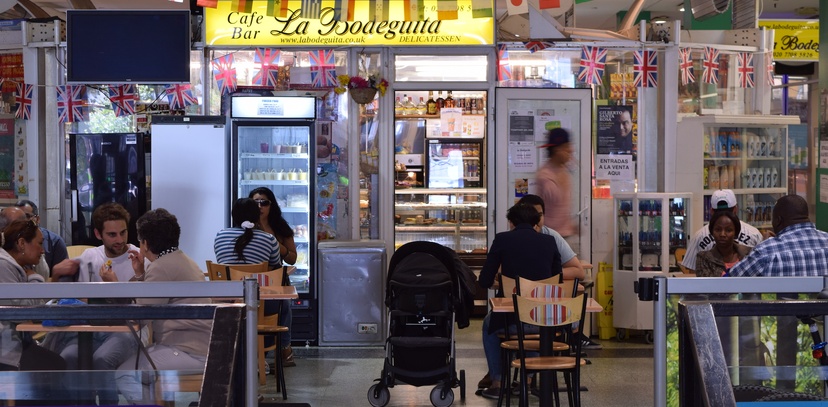Southwark Council’s Cabinet has said it will be prepared to use Compulsory Purchase powers to remove retailers from the Elephant & Castle shopping centre, to enable its redevelopment by its owner Delancey.
The Cabinet has also said it plans to conduct an Equalities Impact Assessment (EqiA), which will look at how the redevelopment of the shopping centre will affect various stakeholders including Black and Minority Ethnic (BME) retailers.
 This seems like a good opportunity for the many BME traders whose livelihoods are threatened by the redevelopment to make their voices heard. Back in 2005, Mayor Ken Livingstone called for the Commission for Racial Equality to investigate the Elephant’s regeneration, after shopping centre traders voiced concerns about how they would be accommodated in the redevelopment. Southwark had already commissioned the Lord Herman Ouseley to investigate its borough wide practices and the report of his findings made the following observations;
This seems like a good opportunity for the many BME traders whose livelihoods are threatened by the redevelopment to make their voices heard. Back in 2005, Mayor Ken Livingstone called for the Commission for Racial Equality to investigate the Elephant’s regeneration, after shopping centre traders voiced concerns about how they would be accommodated in the redevelopment. Southwark had already commissioned the Lord Herman Ouseley to investigate its borough wide practices and the report of his findings made the following observations;
“Large scale regeneration tends to favour relatively big businesses over existing small and medium sized businesses. Because of the diverse nature of the borough and because the business interests of poorer and BME communities tend to be locked in to the SME (small, medium enterprises) sector, equality and diversity competence is critical for planners and decision makers.”(para 41)
As a result of Lord Ouseley’s Inquiry, Southwark pledged ‘to place itself at the forefront of best practice in enterprise development, provision of business support services for SME/BME traders and businesses and planning and regeneration activities, which give priority to local communities at every stage of prospective development proposals and new initiatives’ (para 42); and in 2007 the Council’s Executive signed up to a ‘Traders Charter’ setting out detailed policies on how traders would be secured tapered rent subsidies based on their existing leases in the redeveloped shopping centre. (paras 2.11 & 2.12)
But the pledge has been forgotten and the charter has since been ignored, with Lord Ouseley later claiming that he feared his Inquiry ‘may have been used not so much to uncover any wrongs but to help cover them up’ ; and a 2014 study of shopping centre traders showing just how far Southwark has fallen short of its pledges and ambitions; “Some traders feel that they are ‘hopeless’ or ‘powerless’, ‘angry’ and ‘frustrated’, but feel that there is little that they can do to influence what happens.”
In 2006 (whilst in opposition) Council leader Peter John claimed that the Council “wasn’t doing enough” to help shopping centre traders, and said that “the council should be using its clout to try to secure them some alternative.”
Southwark’s Equalities Impact Assessment would seem like a great opportunity to remedy this, but unfortunately it looks like it might end up being used to a less noble end: the EqiA has not been prompted by any great concern for the traders, but by a request from centre owners and developers Delancey, who have asked that ‘the council consider exercising its compulsory powers‘ to remove leaseholders who have leases which ‘cannot be terminated….within the anticipated regeneration timescale’ and some freeholders too. (para 51 of Cabinet report)
 There is a lot that is questionable about this. First, traders have been pretty much left in the dark for the last decade about what is going on, a fact no better illustrated than by this turn of events – didn’t Southwark think it would be a good idea to ask them what they thought of Delancey’s CPO request? Second, Southwark has carried out EqiAs before, on the Heygate estate and the Aylesbury (68% BME), which failed to prevent the mass displacement of these local BME communities; the big danger is the shopping centre EqiA will just be another routine bureaucratic exercise to satisfy CPO procedural requirements. Third, while getting the CPOs isn’t in the bag yet for Delancey (Southwark will have to consider another report before a final decision), they will nonetheless have a much strengthened bargaining position with any hold-out leaseholders/freeholders (none of whom have named).
The Land Registry shows that whilst most are on short leases, there are a handful of traders in the shopping centre with long leases as well as the superbowl, bingo hall, Charlie Chaplin pub, newsagents and dental practice on New Kent rd. There are also the traders in the railway arches who will need to be removed in order for Delancey to realise its plan to open the arches as access routes.
There is a lot that is questionable about this. First, traders have been pretty much left in the dark for the last decade about what is going on, a fact no better illustrated than by this turn of events – didn’t Southwark think it would be a good idea to ask them what they thought of Delancey’s CPO request? Second, Southwark has carried out EqiAs before, on the Heygate estate and the Aylesbury (68% BME), which failed to prevent the mass displacement of these local BME communities; the big danger is the shopping centre EqiA will just be another routine bureaucratic exercise to satisfy CPO procedural requirements. Third, while getting the CPOs isn’t in the bag yet for Delancey (Southwark will have to consider another report before a final decision), they will nonetheless have a much strengthened bargaining position with any hold-out leaseholders/freeholders (none of whom have named).
The Land Registry shows that whilst most are on short leases, there are a handful of traders in the shopping centre with long leases as well as the superbowl, bingo hall, Charlie Chaplin pub, newsagents and dental practice on New Kent rd. There are also the traders in the railway arches who will need to be removed in order for Delancey to realise its plan to open the arches as access routes.
Delancey’s consultation on the redevelopment of the shopping centre has so far been extremely poor. It has not engaged with the shopping centre traders as a community in the way that it should, and has offered very little to the SME’s that make for the centre’s diversity. Instead it is relying on its power as landlord to clear the centre through termination of shorthold leases and the Council’s CPO powers for those it cannot terminate. As a local planning authority that has required the demoliton of the shopping centre for planning purposes, Southwark has a legal responsibility to the traders and everyone who uses the centre under the 2010 Equalities Act. It must carry put a proper EqiA - not just a tick-box exercise, and must make it clear to Delancey that unless it makes adequate provision for the retailers in its plans, it will not get its CPO.
Other oustanding pledges
Meanwhile we are still waiting for Southwark to deliver on its pledge to make viability assessments public. Nearly four months ago, Council leader Peter John made the pledge in response to criticism arising from disclosure of the Heygate redevelopment’s viability assessment.
Last month, the Council’s pledge was re-iterated by Cabinet member for Regeneration Mark Williams during the following interview with the BBC’s Inside Out TV programme.
But we have still heard nothing about when this policy change will be implemented. Meanwhile developments are still routinely being approved by Southwark without the requisite 35% affordable housing, and our ongoing requests for the viability assessments underpinning them are still being routinely denied.
Postscript update:
Cabinet member Mark Williams has responded via twitter confirming that a policy document will go out for consultation by the end of the year, with its planned adoption in Spring 2016. Watch this space!
